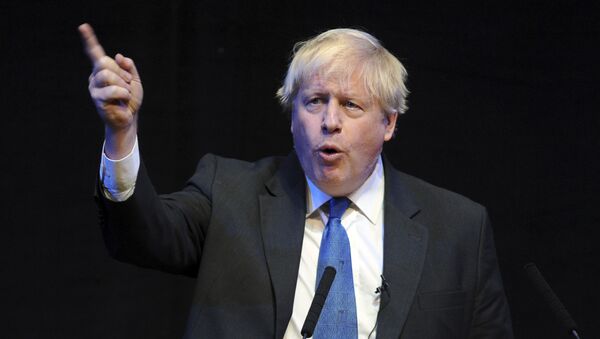Former Foreign Secretary Boris Johnson has been ordered to appear in court on a charge of misconduct in public office over claims Vote Leave made during the Brexit referendum campaign.
Marcus Ball, who has crowdfunded more than £200,000 for a private prosecution, presented his case at Westminster magistrates court last week and on Wednesday, 29 May, District Judge Margot Coleman ruled that the private prosecution can go forward.
Boris Johnson, the front-runner in the Tory leadership race, must face court over allegations he misled the public in the build up to the European Union referendum.
— CourtNewsUK (@CourtNewsUK) 29 May 2019
Judge Coleman said: "The allegations which have been made are unproven accusations and I do not make any findings of fact. Having considered all the relevant factors I am satisfied that this is a proper case to issue the summons as requested for the three offences as drafted. The charges are indictable only. This means the proposed defendant will be required to attend this court for a preliminary hearing, and the case will then be sent to the Crown Court for trial. The charges can only be dealt with in the Crown Court."
An anonymous source reportedly close to Boris Johnson told Daily Mail deputy political editor John Stevens: "The decision to summon Boris Johnson is extraordinary. It is not the role of criminal law to regulate political speech."
Source close to Boris Johnson: "This prosecution is nothing less than a politically motivated attempt to reverse Brexit and crush the will of the people"
— John Stevens (@johnestevens) 29 May 2019
Johnson source: "The decision to summon Boris Johnson is extraordinary. It is not the role of criminal law to regulate political speech"
— John Stevens (@johnestevens) 29 May 2019
Johnson source adds: "This runs counter to centuries of British political tradition and risks undermining our democracy"
— John Stevens (@johnestevens) 29 May 2019
Last week the court was told Johnson "knew the figure (£350 million) was wrong, but still he chose to repeat it over and over."
Johnson, who is the favourite to succeed Theresa May as Prime Minister, was not in court on Wednesday.
Last week his lawyer, Adrian Darbishire QC, said: "It is absolutely denied by Mr Johnson that he acted in an improper or dishonest manner at any time."
Link to reasons given by district judge for granting summons against @BorisJohnson on allegations of misconduct in a public office https://t.co/itKw8vVpNt pic.twitter.com/wIcBnXpRi0
— Joshua Rozenberg (@JoshuaRozenberg) 29 May 2019
In January 2018, Johnson told the Guardian the £350 million sum was actually too low.
Johnson said: "There was an error on the side of the bus. We grossly underestimated the sum over which we would be able to take back control."
He claimed the UK's gross weekly contribution to the EU would rise to £438 million by 2021 and said Brexit would allow the government to "take back control" of this money and spend it on the NHS.
Mr Ball's BrexitJusticeProsecution crowdfunder has raised £227,423 from more than 6,000 supporters.
The Boris case has a VERY long way to go. Step 1 I suspect will be a judicial review of the decision to issue a summons. Given summer holidays etc, this single stage unlikely to be resolved much before end of this year at the earliest.
— CrimeLine (@CrimeLineLaw) 29 May 2019
In Britain most prosecutions are brought by the Crown Prosecution Service (CPS), which is a government agency, but sometimes people fund cases privately.
One of the most famous private prosecutions was in 1994 by the family of Stephen Lawrence, who brought murder charges against Gary Dobson, Luke Knight and Neil Acourt, who they claimed had killed their son.
The private prosecution failed but in 2012 Dobson and another man, David Norris, were jailed for life for Stephen Lawrence's murder.


